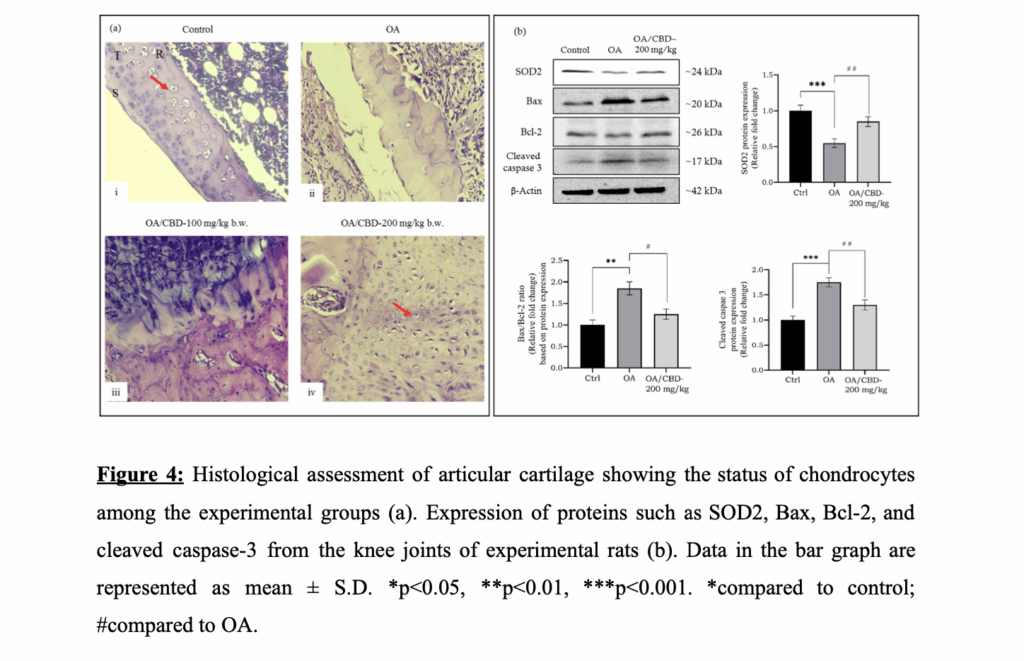📰 Nanoformulated CBD Brings Hope to Osteoarthritis Patients: Czech Research Advances a Global Trend
Osteoarthritis — a degenerative joint disease — is one of the most common chronic conditions worldwide. It affects over 520 million people, including more than 40 million in the European Union, and its prevalence increases with age. Typical symptoms include pain, swelling, stiffness, and reduced joint mobility, all of which can significantly lower quality of life.
Current treatments, based on non-steroidal anti-inflammatory drugs (NSAIDs), corticosteroids, or opioids, alleviate pain but do not address the root cause — inflammation and progressive cartilage degeneration. Long-term use of these medications often leads to serious side effects.
As a result, researchers are turning their attention to alternatives that act more naturally and gently. One of the most promising options is cannabidiol (CBD) — a natural compound from cannabis, known for its anti-inflammatory, antioxidant, and analgesic properties.
🔬 New study confirms: nanoformulated CBD protects joints
Recent research has produced breakthrough results. A scientific team from SRM Institute of Science and Technology in India, in collaboration with Unique Therapeutics Global (Czech Republic), published a 2024 study titled “Nanoformulated Cannabidiol Attenuates Osteoarthritis-Induced Inflammation in Rats.”
The study demonstrates that nanoformulated CBD can reduce inflammation, protect cartilage, and improve joint function in an animal model of osteoarthritis. The tested preparation was a proprietary CBD nanoformulation developed by Unique Therapeutics Global.
“Our results show that nanoformulated CBD significantly suppresses the production of inflammatory molecules, protects cartilage cells, and restores balance in joint tissues,” said Professor K.M. Ramkumar, head of the SRM University research team.
Thanks to its nanoemulsion form, the active compound is better absorbed, has higher bioavailability, and provides longer-lasting effects. The study also confirmed high safety — laboratory animals showed no changes in liver, kidney, or blood parameters, even with long-term administration.
Key findings:
- Improved joint mobility and restored stride length
- Reduced joint inflammation and swelling
- Protection and partial regeneration of cartilage
- Decreased levels of inflammatory markers (TNF-α, IL-1β, IL-6)
- Protection of cells from oxidative stress
🧠 Endocannabinoid system: the body’s natural regulator of pain and inflammation
CBD’s effects are mediated through the endocannabinoid system (ECS) — a network of receptors that regulate pain, immunity, and tissue regeneration. In people with osteoarthritis, the balance of this system is often disrupted, contributing to chronic inflammation and pain.
CBD helps restore balance by activating CB2 and TRPV1 receptors in joint tissues, suppressing pro-inflammatory cytokine production, and reducing oxidative stress. This allows it to address not only the symptoms (pain) but also the underlying cause (inflammation and degeneration).
🌍 CBD in global research: the evidence is growing
The findings from the joint project of Unique Therapeutics and SRM University confirm a trend long observed by the international scientific community.
- In 2017, a team at Dalhousie University, Canada (Philpott et al., PAIN Journal) demonstrated that local application of CBD reduced pain and inflammation and prevented nerve damage in rats with osteoarthritis.
- In 2015, Hammell et al. (Eur. J. Pain) showed that transdermal CBD gel reduced swelling and pain in animal models of arthritis without any side effects.
- Bryk & Starowicz (Pharmacological Reports, 2021) confirmed that activation of CB2 receptors can slow cartilage degeneration and reduce pain sensitivity.
The ongoing collaboration between SRM University and Unique Therapeutics builds on this work using a standardized CBD nanoformulation designed for pharmaceutical testing. This formulation enables precise dosing, greater stability of the active compound, and reproducible results in both laboratory and clinical settings.
This makes it the most advanced preclinical study of its kind, directly transitioning into human trials.
👩⚕️ From lab results to patients: clinical phase begins
After approval by the ethics committee, the research is moving to the next step — clinical trials in osteoarthritis patients. The study will involve 60 volunteers over 90 days, testing nano CBD from Unique Therapeutics.
If clinical outcomes confirm the benefits observed in animals, the study will be evaluated and submitted to regulatory authorities in India as a foundation for registering a new drug for arthritis and joint pain.
⚙️ The future of treatment: combining nature and technology
CBD is evolving from a supplement into a full-fledged pharmaceutical compound. Combining scientific research, nanotechnology, and natural anti-inflammatory effects offers real hope for safer osteoarthritis treatments without the side effects of conventional drugs.
The Unique Therapeutics project continues global research while pushing boundaries further — toward a medication derived from nature that meets all modern medical standards.
📚 References:
- Jayasuriya R. et al. (2024). Nanoformulated Cannabidiol Attenuates Osteoarthritis-Induced Inflammation in Rats.SRM Institute of Science and Technology & Unique Therapeutics Global.
- Philpott H.T., O’Brien M., McDougall J.J. (2017). Attenuation of early phase inflammation by cannabidiol prevents pain and nerve damage in rat osteoarthritis. PAIN, 158(12):2442–2451.
- Hammell D.C. et al. (2015). Transdermal cannabidiol reduces inflammation and pain-related behaviours in a rat model of arthritis. Eur J Pain, 20(6):936–948.
- Bryk M., Starowicz K. (2021). Cannabinoid-based therapy as a future for joint degeneration. Pharmacological Reports, 73(3):681–699.
